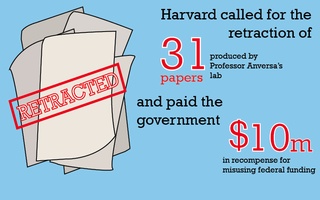{shortcode-950a82dde837295d81484189d1855a18ef7cfbf0}
Xiaowei Zhuang, a professor of Chemistry and Chemical Biology, was named the recipient of the 2019 Breakthrough Prize in Life Sciences for her groundbreaking work in super-resolution fluorescence microscopy.
Zhuang’s laboratory invented Stochastic Optical Reconstruction Microscopy, or STORM, an imaging technique that surpasses the limitations of traditional light microscopes to create 3-D, ultra-high resolution images of cells and tissues.
Using STORM, Zhuang and fellow researchers at her Harvard laboratory have been able to discover previously unknown cellular structures, such as periodic membrane skeletons in neurons.
“It feels particularly rewarding, and it’s a great feeling that we can make new biological discoveries using new methods we ourselves invented,” Zhuang said in a press release.
The Breakthrough Prize is a set of international awards which honor outstanding contributions to the fields of life sciences, mathematics, and fundamental physics. Winners receive $3 million each, making it the most lucrative science prize in the world. Sponsors of the prize include Google co-founder Sergey Brin, Facebook CEO Mark E. Zuckerberg and Priscilla Chan ’07.
Zhuang received high praise from the awards board, being touted as a “child prodigy.”
“At age six, she was able to identify the atmospheric force acting upon a glass of water, impressing her father, an aerodynamics professor at China’s leading science and technology university,” a press release from the Breakthrough Prize reads.
Zhuang and fellow laureates will be recognized at the seventh annual Breakthrough Prize ceremony — a gala dubbed “the Oscars of Science” — on Nov. 4.
Zhuang said she appreciated the recognition that came with the awards announcement, but emphasized that accolades are not the driving force behind her research.
“Being recognized is gratifying, but as scientists we don’t work with a goal of winning prizes. We do science because we love it and we love making discoveries and understanding how things work,” Zhuang said in a press release.
Zhuang was appointed as an assistant professor in the Chemistry and Chemical Biology Department in 2001 and joined the Howard Hughes Medical Institute as an investigator in 2005. She received tenure in 2006.
While the Zhuang Laboratory mainly focuses on cell biology and neurobiology, the advances in imaging made by Zhuang and her colleagues are broadly applicable to other fields that rely on microscopy, including medicine.
Recommended Articles
-
REWARD FOR ORIGINALITYThe Boylston and Lee Wade Elocution contest was a brilliant success. The selections were well chosen and splendidly delivered. More
-
No HeadlineThe examinations are over and some part of the energy that has been given to them must find new outlets.
-
Tennis Tournament.The tennis tournament for the championship of New England began at New Haven on Monday. The grounds of the New
-
OFFERS SERIES OF PRIZES FOR BUSINESS RESEARCHThe Chicago Trust Company has announced a series of prizes to be offered for the purpose of stimulating research in
-
 New Data Reveals Harvard Researchers Saw Spate of Retractions In Last Decade
New Data Reveals Harvard Researchers Saw Spate of Retractions In Last Decade













